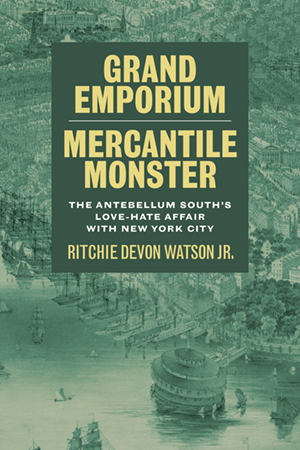
264 pages / 6.00 x 9.00 inches / no illustrations
History / United States - 19th Century | Literary Criticism / American | Literary Criticism / American - Regional
Focusing on the crucial period of 1820 to 1860, Grand Emporium, Mercantile Monster examines the strong economic bonds between the antebellum plantation South and the burgeoning city of New York that resulted from the highly lucrative trade in cotton. In this richly detailed work of literary and cultural history, Ritchie Devon Watson Jr. charts how the partnership brought fantastic wealth to both the South and Gotham during the first half of the nineteenth century. That mutually beneficial alliance also cemented New York’s reputation as the northern metropolis most supportive of and hospitable to southerners.
Both parties initially found the commercial and cultural entente advantageous, but their collaboration grew increasingly fraught by the 1840s as rising abolitionist sentiment in the North decried the system of chattel slavery that made possible the mass production of cotton. In an effort to stem the swelling tide of abolitionism, conservative southerners demanded absolute political fealty to their peculiar institution from the city that had profited most from the cotton trade. By 1861, reactionary circles in the South viewed New York’s failure to extend such unalloyed validation as the betrayal of an erstwhile ally that in the words of one polemicist deemed Gotham worthy of being “blotted from the list of cities.”
Drawing on contemporary letters, diaries, fiction, and travel writings, Grand Emporium, Mercantile Monster provides the first detailed study of the complicated relationship between the antebellum South and New York City in the decades leading up to the Civil War.
Ritchie Devon Watson Jr. is professor emeritus of English at Randolph-Macon College. His previous books include Normans and Saxons: Southern Race Mythology and the Intellectual History of the American Civil War.
“Serious students of the U.S. South have long been aware of the ties—economic but also literary and cultural—between the antebellum South and New York City, but no one has told the story of this relationship in all its complexity as Ritchie Devon Watson Jr. has in this book. Well-researched and extremely well-written, this is a superb exploration of an important subject.”—Fred Hobson, author of Tell About the South: The Southern Rage to Explain
Found an Error? Tell us about it.